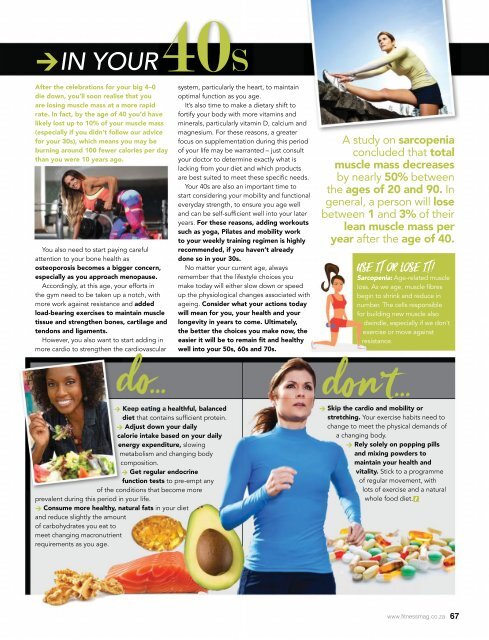Fitness_South_Africa_JulyAugust_2017
You also want an ePaper? Increase the reach of your titles
YUMPU automatically turns print PDFs into web optimized ePapers that Google loves.
IN YOUR40s<br />
After the celebrations for your big 4–0<br />
die down, you’ll soon realise that you<br />
are losing muscle mass at a more rapid<br />
rate. In fact, by the age of 40 you’d have<br />
likely lost up to 10% of your muscle mass<br />
(especially if you didn’t follow our advice<br />
for your 30s), which means you may be<br />
burning around 100 fewer calories per day<br />
than you were 10 years ago.<br />
You also need to start paying careful<br />
attention to your bone health as<br />
osteoporosis becomes a bigger concern,<br />
especially as you approach menopause.<br />
Accordingly, at this age, your efforts in<br />
the gym need to be taken up a notch, with<br />
more work against resistance and added<br />
load-bearing exercises to maintain muscle<br />
tissue and strengthen bones, cartilage and<br />
tendons and ligaments.<br />
However, you also want to start adding in<br />
more cardio to strengthen the cardiovascular<br />
system, particularly the heart, to maintain<br />
optimal function as you age.<br />
It’s also time to make a dietary shift to<br />
fortify your body with more vitamins and<br />
minerals, particularly vitamin D, calcium and<br />
magnesium. For these reasons, a greater<br />
focus on supplementation during this period<br />
of your life may be warranted – just consult<br />
your doctor to determine exactly what is<br />
lacking from your diet and which products<br />
<br />
Your 40s are also an important time to<br />
start considering your mobility and functional<br />
everyday strength, to ensure you age well<br />
<br />
years. For these reasons, adding workouts<br />
such as yoga, Pilates and mobility work<br />
to your weekly training regimen is highly<br />
recommended, if you haven’t already<br />
done so in your 30s.<br />
No matter your current age, always<br />
remember that the lifestyle choices you<br />
make today will either slow down or speed<br />
up the physiological changes associated with<br />
ageing. Consider what your actions today<br />
will mean for you, your health and your<br />
longevity in years to come. Ultimately,<br />
the better the choices you make now, the<br />
<br />
well into your 50s, 60s and 70s.<br />
sarcopenia<br />
total<br />
muscle mass decreases<br />
by nearly 50% between<br />
the ages of 20 and 90. In<br />
general, a person will lose<br />
between 1 3% of their<br />
lean muscle mass per<br />
year after the age of 40.<br />
USE IT OR LOSE IT!<br />
Sarcopenia: Age-related muscle<br />
<br />
begin to shrink and reduce in<br />
number. The cells responsible<br />
for building new muscle also<br />
dwindle, especially if we don’t<br />
exercise or move against<br />
resistance.<br />
on’t...<br />
<br />
healthful, balanced<br />
diet <br />
Adjust down your daily<br />
calorie intake based on your daily<br />
energy expenditure, slowing<br />
metabolism and changing body<br />
composition.<br />
<br />
Get regular endocrine<br />
function tests to pre-empt any<br />
of the conditions that become more<br />
prevalent during this period in your life.<br />
Consume more healthy, natural fats in your diet<br />
and reduce slightly the amount<br />
of carbohydrates you eat to<br />
meet changing macronutrient<br />
requirements as you age.<br />
he cardio and mobility or<br />
hing. Your exercise habits need to<br />
change to meet the physical demands of<br />
a changing body.<br />
Rely solely on popping pills<br />
and mixing powders to<br />
maintain your health and<br />
vitality. Stick to a programme<br />
of regular movement, with<br />
lots of exercise and a natural<br />
whole food diet.<br />
<br />
67

















